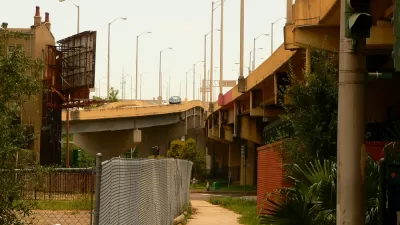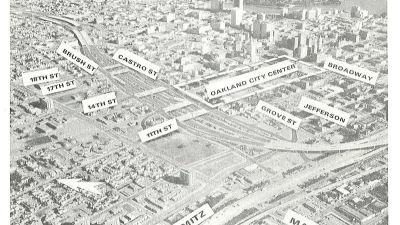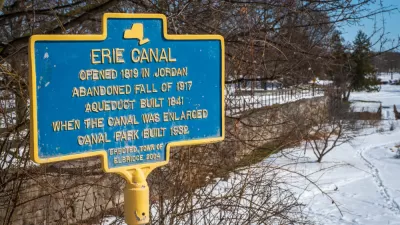This editorial from Karrie Jacobs suggests that we can find smarter uses for the interstate highway system.
"If we are going to spend billions rehabbing the highways, shouldn't we, at the same time, invest in adjacent rail lines like the 800-mile high-speed rail system voters approved last year in California.
The corridors are also perfectly suited for the transportation of energy. Power generated from rural wind farms and solar plants could run through lines buried under the highways to big cities where electricity is needed. The plug-in hybrid vehicles that will someday use the highways could charge up from this grid. And when left idling, these cars would also be able to supply power back to the grid at times of peak demand, while their owners work or shop by the roadside."
FULL STORY: Revolutionary Road

Planetizen Federal Action Tracker
A weekly monitor of how Trump’s orders and actions are impacting planners and planning in America.

Maui's Vacation Rental Debate Turns Ugly
Verbal attacks, misinformation campaigns and fistfights plague a high-stakes debate to convert thousands of vacation rentals into long-term housing.

Restaurant Patios Were a Pandemic Win — Why Were They so Hard to Keep?
Social distancing requirements and changes in travel patterns prompted cities to pilot new uses for street and sidewalk space. Then it got complicated.

In California Battle of Housing vs. Environment, Housing Just Won
A new state law significantly limits the power of CEQA, an environmental review law that served as a powerful tool for blocking new development.

Boulder Eliminates Parking Minimums Citywide
Officials estimate the cost of building a single underground parking space at up to $100,000.

Orange County, Florida Adopts Largest US “Sprawl Repair” Code
The ‘Orange Code’ seeks to rectify decades of sprawl-inducing, car-oriented development.
Urban Design for Planners 1: Software Tools
This six-course series explores essential urban design concepts using open source software and equips planners with the tools they need to participate fully in the urban design process.
Planning for Universal Design
Learn the tools for implementing Universal Design in planning regulations.
Heyer Gruel & Associates PA
JM Goldson LLC
Custer County Colorado
City of Camden Redevelopment Agency
City of Astoria
Transportation Research & Education Center (TREC) at Portland State University
Jefferson Parish Government
Camden Redevelopment Agency
City of Claremont





























